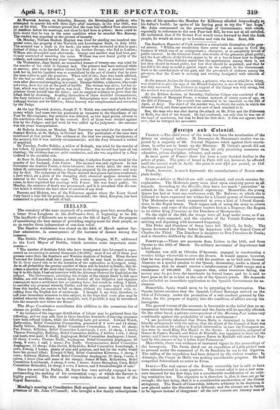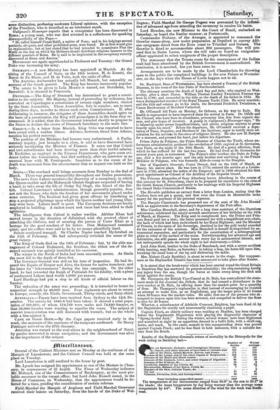goreign anb Qrolonfal.
FBANCE.—The chief event of the week has been the termination of the debate on electoral reform. M. Dnvergier de Haurann&s motion. was re- jected by a majority of 98. Several Deputies voted against their convic- tions, in order not to break up the Ministry. M. Guizot's speech did not satisfy the "young Conservatives," from its only promising measures on education, prison discipline, colonies, and excise.
In most parts of France there has been a very decided decline in the prices of grain. The price of bread in Paris will not, however, be affected until the second week in April: the price is now 2,1d. per pound, or 11,d . the four-pound loaf'.
Trade, however, is much depressed: the manufacturers of Rouen com- plain loudly.
Sratm—Affairs at Madrid are still complicated, and much remains for. explanation. The Moderado party seem bent upon retaining power at all hazards. According to the Heraldo, they have too much " patriotism" to submit to the loss of their political supremacy. Meanwhile, the young Queen has had at least one conference with Mr. Bulwer; at which she M believed to have expressed her wishes for a Liberal system of Government, The Moderados are much exasperated at even a hint of Liberal disposi, tions in the Royal breast. Their organs talk of using the army to coerce the Queen; and some of the military leaders hint at a Regency, the Regent to be either King Francisco or the Dutchess of Montpensier.
On the night of the 22d, the troops were all kept under arms, as if an outbreak were expected; and the couriers of the French Embassy were arriving and departing with increased frequency.
The Duke and Datchess of Sean have left Madrid, for Italy. The Queen decorated the Duke before his departure with the Grand Cross of- Charles the Third. The Dutchess is daughter to Don Francisco de Paula; and is therefore disliked by the Moderados.
PoRTnear ,—There are accounts from Lisbon to the 18th, and from Oporto to the 19th of March. No military movement of importance had taken place.
Saldanha was still at Oliveira D'Azemais, engaged in constructing a wooden bridge wherewith to cross the Douro. It would appear, however, that he was getting discontented with his position, as he had sent General Ximenes on a special mission to the Queen, demanding, under a threat of resignation, that he should receive a reinforcement of 7,000 troops and a remittance of 100,000/. He suggests that, other resources failing, the money may be got from the merchants by forced loans; and he is said to have gone so far as to hint at the sale of the Queen's jewels. His demands also included an immediate application to the Spanish Government for as sistance.
Meanwhile, Spain would seem to be preparing for intervention. Ties= Oportoletters mention that the Spanish Colonel Buenaga arrived on the - 18th of February, under the protection of a safe conduct granted by Pas Antes, for the purpose of inquiry into the condition of affairs among the, insurgents.
The general tenour of the accounts is favourable to the belief that an ex- rangement between the Government and the Junta will be speedily effected,. On the other hand, a private correspondent of the Morning Post writes very confidently against the probability of such a settlement-
" I am positively informed that Donna Maria is determined to listen to no friendly arrangement with the nation; that the object of the Council of State was to fix the grounds for calling in English intervention ip case the Portuguese na- tion were to recall King Don Miguel to the throne. A committee, composed of Gomez de Castro, Bayard, and Baron de Renduffe, was appointed to thaw out the terms; and I have every reason to suppose Baron de Renduffe will start for Eng- land by this steamer to lay it before Lord Palmerston."
Meanwhile, there was evidence of increased vigour in the proceedings of the insurgents. The Junta fitted out an expedition of 1,200 picked men to proceed under the command of Sit da Bruideira by sea to the Algarvee. The sailing of the expedition had been delayed by the violent weather. In Alemtejo, the Count de Mello was making considerable progress. He had compelled Schwalbach to retire to Elves.
Ir J.-Ir.—The real nature of the Roman censorship law is said to hay@ been misunderstood in some quarters. The recent edict is not a new mea- sure imposed for the first time, but a considerable modification of an exist- ing restrictive law. The objection to it therefore is, that it does not go far enough; the fact being, that it is a considerable amelioration of the forme?! stringency. The Board of Censorship, hitherto arbitrary in its decisions, m now placed under the direction of a tribunal; and the censors are in future to be laymen instead of clergymen: all the new censors are literary men ct
Some distinction, professing moderate Liberal opinions, with the exception of the President, who is described as an intolerant monk. Galignanis Messenger reports that a conspirator has been discovered in Rome; a young man, who was first arrested in a coffeehouse for speaking disrespectfully of the Pope- " He called himself Count Heidi, a native of Fano; and in his lodgings several poniards, air-guns, and other prohibited arms, were found. He at first would give no explanations; but at last stated that he had intended to assassinate Pius the Ninth on the day on which his Holiness should distribute religions banners to the different quarters of Rome. He is said to be implicated in the conspiracy recently discovered at Rome and Ancona."
Movements are again apprehended in Piedmont and Tuscany: the Grand Duke was increasing his army.
GERMANY.—A new Ministry has been appointell at Munich. At the sitting of the Council of State, on the 19th instant, M. de Zenetti, the Baron de Zn Rhein, and M. de Voltz, took the oaths of office.
The Austrian Ambassador has actually left Munich, but ostensibly on account of the Greek quarrel. The King has become immensely popular. The estate to be given to Lola Montez is named, not Stemheim, but Sternfeld: it is situated in Franconia.
DENMARK.—The King of Denmark has determined to grant a consti- tution to his subjects. His Majesty, instead of proceeding by ordinance, has convoked at Copenhagen a commission of twenty-eight members, elected by the State Assemblies. Those Assemblies, four in number, are to meet during three days, in order to choose each seven Commissioners. If after deliberating in common, the delegates of those Assemblies should agree on the basis of a constitution, the King will promulgate it in the form they re- commend. It is added, that the Government intended shortly to propose to the States to declare the crown of Denmark hereditary in the male line.
GREECE.—In a letter from Munich, King Otho was reported to have been seized with a sudden illness. Advices, however, direct from Athens, mention his perfect recovery.
The position of the Ministers had become very embarrassed. A Parlia- mentary inquiry, just brought to a close, is said to have discovered facts seriously inculpating the Minister of Finance. It came out that Coletti and two subordinates had been drawing more than their lawful salaries. M. Krokidas, an employe in the Finance Department, who gave some evi- dence before the Commission, had died suddenly, after an interview at an unusual hour with M. Pouiropoulo. Suspicion as to the cause of his death was increased from the circumstance that no inquest was held on the body.
INDIA.—The overland mail brings accounts from Bombay to the 2nd of March. There was general tranquillity throughout our Indian possessions.
The news from Lahore mentions the discovery of a conspiracy, in which the Queen-mother and the Maharajah Gholab Singh are suspected of having a hand, to take away the life of Sirdar Tej Singh, the friend of the Bri- tish. Colonel Lawrence's administration, though generally popular, does not suit the Ranee, who finds the freedom of her movements placed under some restraint. The Resident had given great offence by interfering to stop a projected pilgrimage upon which the Queen-mother and young Dhu- leep were bent. Lahore itself is quiet. The European denizens are busily employed in building. A racket-court and races had been added to their agremens. The intelligence from Cabool is rather warlike. Akhbar Khan had moved troops in the direction of Jellalabad, with the avowed object of attacking the Ghilzies, and of securing the person of Uzeer Khan as a hostage for the good conduct of his father. Dost Mohammed remained quiet; and his coffers were said to be by no means plentifully lined. Scinde continued tranquil. Sir Charles Napier reached Hyderabad on the 11th of February. He had subsequently revisited the scene of his great victory. The King of Dude died on the 13th of February; but, by the able ma- nagement of Colonel Richmond, the Resident, the eldest son of the de- ceased monarch was quietly installed as his successor.
The winter in the North of India had been unusually severe. At Simla the mow fell to the depth of three feet.
The Governor-General was still on his tour of inspection. He had de- posed the Rajahs of Roopur and Alvo, the former for active treachery, and the latter for "lukewarmness " during the late campaign. On the other band, he had rewarded the Rajah of Puttialah for his fidelity, with apiece of confiscated Lahore land worth 1,000/. per annum.
Lord Hardinge had put a stop to all kinds of official labour on the Sunday.
The reduction of the army was proceeding: it is intended to lessen its numerical strength by 40,000 men. Four regiments are about to return to Europe, namely, the Ninth, Seventeenth, Thirty-ninth, and Sixty-third.
Atrierassaa.—Papers have been received from Sydney to the 12th De- cember. The census for 1845-6 had been taken: it showed a total popu- lation of 189,609; of whom 114,769 were males and 74,840 females, so that 38,000 females were wanting to equalize the sexes. The subject of convict transportation was still discussed with warmth, but on the whole with a bias against it.
CAPE OF Goon HOPE.—By the Cape papers received early in the week, the accounts of the successes of the troops are confirmed. Sir Henry rottinger arrived on the 27th January.
Attention was turned to the coal-mines in the neighbourhood of Natal, by parties interested in steam navigation; and the Government was alive to the importance of the subject.



































 Previous page
Previous page